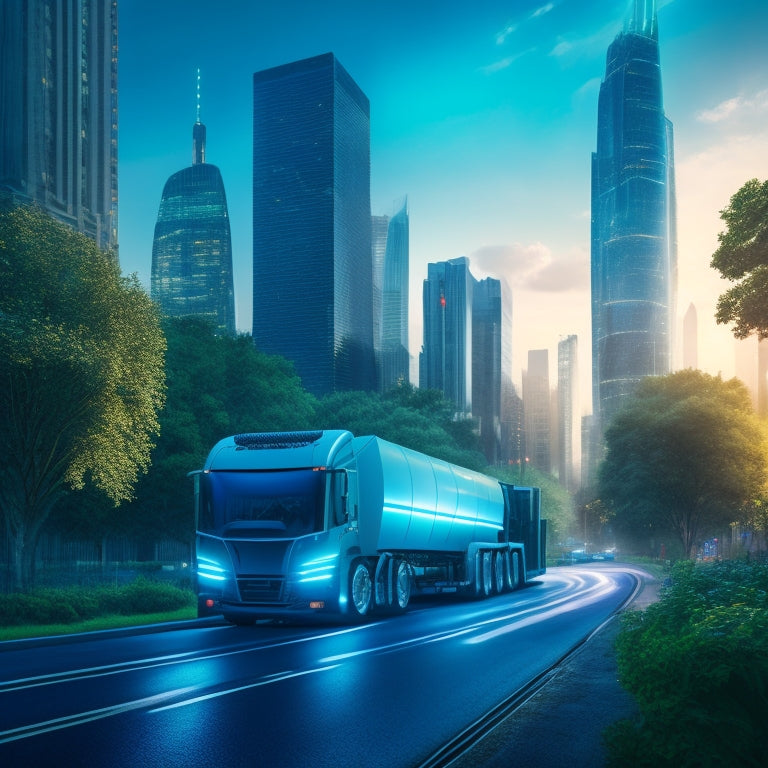
Electric Garbage Trucks Pave Greener Future Ahead
Share
Electric garbage trucks are poised to revolutionize waste management by greatly reducing greenhouse gas emissions and air pollution, aligning with sustainability goals and paving the way towards a cleaner, healthier future. These eco-friendly vehicles offer numerous benefits, including lower operating costs, improved efficiency, and enhanced productivity. With advancements in battery technology and infrastructure, electric garbage trucks are becoming a viable alternative to traditional diesel-powered trucks. As the industry continues to evolve, exploring the intricacies of infrastructure development, cost savings, and performance capabilities will be essential in opening up a greener future for waste management.
Key Takeaways
• Electric garbage trucks reduce greenhouse gas emissions and air pollution, aligning with sustainability goals to combat climate change.
• They generate long-term cost savings through lower operating expenses, reduced fuel costs, and minimized maintenance needs.
• Electric trucks boast comparable performance to diesel counterparts, with high torque levels facilitating waste collection operations.
• Developing essential charging infrastructure is critical, with strategic placement of charging stations and fast-charging technology.
• Government incentives can overcome high upfront costs, and education can reduce range anxiety, paving the way for a greener future.
Environmental Benefits Abound
Shifting greenhouse gas emissions and air pollution, electric garbage trucks are paving the way towards a cleaner and healthier environment. By adopting electric garbage trucks, municipalities can greatly reduce their carbon footprint, aligning with sustainability goals to combat climate change.
Raising public awareness about the environmental benefits of electric garbage trucks is essential, as it can garner support for policy incentives that encourage their adoption. Governments can offer incentives, such as tax credits or subsidies, to encourage the shift to electric fleets.
As the benefits of electric garbage trucks become more apparent, policy incentives can play an important role in accelerating their adoption, ultimately contributing to a cleaner and healthier environment for future generations.
Cutting Costs, Boosting Efficiency
One of the most significant advantages of electric garbage trucks is their potential to generate long-term cost savings through lower operating expenses and reduced maintenance needs. This is an important consideration for municipalities and waste management companies looking to optimize their operations.
By adopting electric vehicles, they can:
-
Lower operating expenses through reduced fuel costs
-
Enhance productivity by minimizing downtime for maintenance
-
Reduce maintenance costs due to fewer moving parts
-
Take advantage of government incentives for electric vehicle adoption
-
Improve overall efficiency through optimized routes and scheduling
Performance and Reliability Unleashed
Moreover, markedly Electric garbage trucks boast comparable performance to their diesel counterparts, with high torque levels facilitating efficient waste collection operations. The high torque output enables swift acceleration and smooth navigation through dense urban areas, ensuring uninterrupted waste collection services.
Battery advancements have greatly improved reliability, allowing electric garbage trucks to operate consistently throughout the day. The regenerative braking system also helps extend battery life, reducing downtime and increasing overall productivity. Moreover, torque efficiency is enhanced through advanced motor control systems, optimizing energy consumption and minimizing waste.
With these technological advancements, electric garbage trucks have become a reliable and efficient solution for waste management, paving the way for a greener future.
Infrastructure and Charging Essentials
Developing an essential charging infrastructure is critical for the widespread adoption and efficient operation of electric garbage trucks. It enables seamless charging and minimizes downtime during shifts. This infrastructure development involves strategic planning to guarantee that charging stations are located in convenient and accessible areas.
Effective charging logistics are paramount to support the daily operations of electric garbage trucks.
Key considerations for infrastructure development and charging logistics include:
- Strategic placement of charging stations to minimize downtime
- Fast-charging technology to reduce charging time
- Fleet management systems to optimize charging schedules
- Collaboration with utilities to ensure grid integration
- Development of standardized charging protocols for interoperability
Overcoming Adoption Hurdles
Despite the numerous benefits of electric garbage trucks, several hurdles must be overcome to facilitate widespread adoption, including high upfront costs, limited driving ranges, and the need for specialized training programs. To address these challenges, municipalities and private companies must invest in education and training initiatives.
| Barrier | Impact | Solution |
|---|---|---|
| High Upfront Costs | High initial investment | Government incentives, grants |
| Limited Driving Range | Range anxiety, strategic route planning | Fast-charging infrastructure, route optimization |
| Specialized Training | Lack of skilled workforce | Training programs, workshops, and certifications |
| Range Anxiety | Driver uncertainty, reduced adoption | Education, data-driven range estimates |
| Grid Capacity | Strained electrical infrastructure | Collaboration with utilities, grid upgrades |
Frequently Asked Questions
How Can Municipalities Incentivize Electric Garbage Truck Adoption?
Municipalities can incentivize electric garbage truck adoption by offering tax breaks, government subsidies, fleet incentives, and low-interest loans, thereby reducing financial barriers and encouraging a smooth shift to environmentally friendly waste management practices.
Are Electric Garbage Trucks Suitable for Rural Waste Collection Operations?
Rural waste collection operations can benefit from electric garbage trucks, leveraging route optimization and fuel efficiency to overcome rural infrastructure challenges, while ensuring vehicle durability and fostering community engagement through environmentally responsible practices.
Can Existing Diesel Trucks Be Retrofitted With Electric Systems?
Retrofitting existing diesel trucks with electric systems is feasible, but poses challenges, including battery swaps, which can be complex and costly, requiring significant modifications to the vehicle's architecture and infrastructure.
Do Electric Garbage Trucks Require Specialized Maintenance Facilities?
'Electric garbage trucks necessitate specialized maintenance facilities, requiring Facility Upgrades to accommodate unique electrical systems and Technician Training to guarantee competent handling of high-voltage components, ensuring efficient and safe maintenance operations.'
Can Electric Garbage Trucks Operate Effectively in Extreme Weather Conditions?
"Electric garbage trucks can operate effectively in extreme weather conditions, leveraging advanced battery durability and climate resilience features, ensuring uninterrupted waste collection services despite harsh temperatures, humidity, or precipitation."
Related Posts
-

10 Best WiFi Outlets for Tracking Home Energy Usage
You can optimize your home's energy usage with the right WiFi outlets, which provide real-time monitoring and control...
-

Why EVs Inspire Earth-Conscious Home Design Choices
As you shift to an electric vehicle, you're not just switching to a greener ride, you're igniting a broader commitmen...
-

Why Choose Solar Composting Toilets for Your Home?
By choosing a solar composting toilet for your home, you'll greatly reduce your environmental impact, slashing your w...


